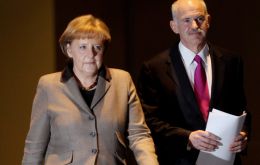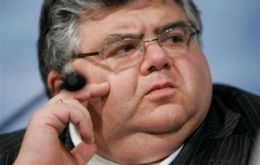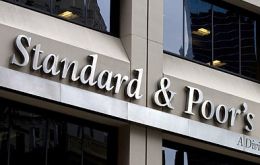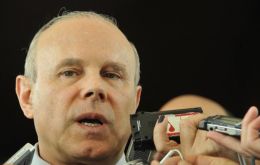MercoPress. South Atlantic News Agency
Economy
-
Wednesday, September 28th 2011 - 01:17 UTC
Germany promises help to rebuild confidence in debt-stricken Greece

Germany will do all it can to rebuild confidence in debt-stricken Greece as it implements reforms to meet the conditions of its international bailout package, Chancellor Angela Merkel said on Tuesday.
-
Wednesday, September 28th 2011 - 00:58 UTC
Argentine 2010/11 crop a “historic record” breaks 100 million tons benchmark

Argentina 2010/2011 crop reached 102.082 million tons of grains and oil seeds, a ‘historic record’, according to an official release from the Ministry of Agriculture.
-
Tuesday, September 27th 2011 - 22:45 UTC
Inflation picking up and lower interest rates, forecasts Brazil central bank survey

Brazil’s central bank will miss its inflation target this year for the first time since 2003 according to a central bank survey of economists. Consumer prices will rise 6.52% this year, according to the median forecast in a Sept. 23 central bank survey of about 100 analysts published Monday.
-
Tuesday, September 27th 2011 - 22:42 UTC
Latam currencies weakness ‘transitory’ says Mexican central bank

Mexican central bank Governor Agustin Carstens said the Peso’s weakness is “transitory” and the currency is likely to resume its upward trend, along with other Latin American currencies.
-
Tuesday, September 27th 2011 - 22:35 UTC
Argentina’s bumpy ride (and hopefully smooth landing)

The following piece was written by Andrés Velasco, a former Minister of Finance of Chile, and visiting professor at Columbia University for 2011-2012. As a neighbour of Argentina, first, and then as an economist he is well entitled to give an accurate briefing.
-
Tuesday, September 27th 2011 - 05:58 UTC
World Bank reminds Argentina of G20 duties and urges payment of defaulted debts

Argentina should pay its debt with the Paris Club group of creditor nations if it wants to continue receiving foreign investment, said Paolo Martelli, director for Latin America of the World Bank’s International Finance Corp, reports Buenos Aires daily La Nación.
-
Tuesday, September 27th 2011 - 04:56 UTC
S&P faces first action by US government against a major credit rating agency

United States regulators disclosed they may take action against Standard & Poor's for securities law violations after the ratings agency gave top grades to a package of securitized mortgages in 2007 that quickly soured.
-
Tuesday, September 27th 2011 - 01:39 UTC
Brazilian officials committed to protect the Real from international volatility

Brazil’s Finance Minister Guido Mantega returned home early from the IMF/World Bank meetings in Washington this weekend, after a plunge in the Real extended the world’s biggest currency slump over the past month.
-
Tuesday, September 27th 2011 - 01:36 UTC
Chilean company farming algae for future production of bio-fuels

BAL Chile SA is dedicated to farming algae on the island of Chiloé and in a second stage, plans to produce bio-fuels for industrial use, announced the company’s CEO Benjamin González.
-
Monday, September 26th 2011 - 18:33 UTC
Uruguay begins negotiations to mitigate Brazilian trade restrictions

A Uruguayan government delegation will begin talks on Tuesday in Brazil to address the latest restrictions imposed by Mercosur largest member and which threaten several manufacturing sectors, particularly the auto industry, said Foreign Affairs minister Luis Almagro.
